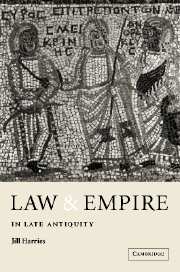Book contents
- Frontmatter
- Contents
- Preface
- Introduction
- 1 The law of Late Antiquity
- 2 Making the law
- 3 The construction of authority
- 4 The efficacy of law
- 5 In court
- 6 Crime and the problem of pain
- 7 Punishment
- 8 The corrupt judge
- 9 Dispute settlement I: out of court
- 10 Dispute settlement II: episcopalis audientia
- Conclusion
- Bibliography
- Index
8 - The corrupt judge
Published online by Cambridge University Press: 22 September 2009
- Frontmatter
- Contents
- Preface
- Introduction
- 1 The law of Late Antiquity
- 2 Making the law
- 3 The construction of authority
- 4 The efficacy of law
- 5 In court
- 6 Crime and the problem of pain
- 7 Punishment
- 8 The corrupt judge
- 9 Dispute settlement I: out of court
- 10 Dispute settlement II: episcopalis audientia
- Conclusion
- Bibliography
- Index
Summary
In the 380s, a Christian writer at Rome of modest literary attainments consoled himself for the bad state of things in this world with the contemplation of their reversal in the next. Why, he asked, did people flout the Law of God and get away with it?
‘So why, here, are sinners kept free from fear by their power, while some make a mockery of the statutes, the poor are oppressed, accusations are framed against the righteous … wicked and corrupt men are held in honour, greedy and grasping men grow rich, and the judge is for sale? …‘ (In the next world) ‘those who used their power to despise the statutes or made a mockery of the law by sharp practice in their pursuit of wickedness, so puffed up in these ways that they might have appeared to trample on justice itself, – they shall be brought low and overthrown and shall be subjected to torments …
The rhetoric of the passage is familiar: the villains are the powerful, the unworthy rulers, the greedy – and the corrupt judge. Similar generalisations were made by another Italian, Maximus of Turin (c. 400), who warned his congregation that they should not make false accusations, yet ‘the abuse has grown to such an extent that the laws are sold, statutes corrupted and verdicts habitually venal’, while Zeno of Verona attacked the greedy, including, among others, judges who gained money by gratia.
- Type
- Chapter
- Information
- Law and Empire in Late Antiquity , pp. 153 - 171Publisher: Cambridge University PressPrint publication year: 1999

